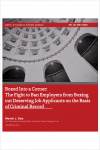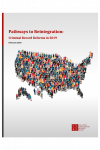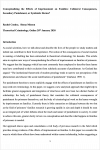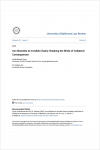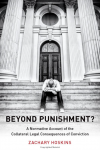Resources
"Search Results" - 163 item(s) found.
-
Katie Buitrago and Sandra Escobar-Schulz, Social Impact Research Center
(June 2020)This first-of-its-kind study from the Social Impact Research Center at the Heartland Alliance confirms that more than 3.3 million people in Illinois could be impacted by permanent punishments as a result of prior "criminal justice system" involvement, which, the authors argue, is more accurately referred to as the "criminal legal system" ... -
Cynthia A. Golembeski, The Conversation
(June 2020)This article from Robert Wood Johnson Foundation Health Policy Research Scholar, Cynthia Golembeski, provides an overview of collateral consequences that could last a lifetime for those with criminal convictions in the United States. These restrictions, tracked in great detail on the National Inventory of Collateral Consequences of Conviction (NICCC), can include everything like ... -
Mariah L. Daly, Michael E. Moritz College of Law, Ohio State University (OSU)
(May 2020)This journal article argues that Ban-the-Box, which, broadly, represents a campaign that seeks to influence all jurisdictions to enact legislation requiring the removal of questions and check boxes asking about criminal history on applications for employment, housing, public benefits, insurance, loans, and other services laws should be expanded and made uniform across ... -
Margaret Love and David Schlussel, Collateral Consequences Resource Center
(February 2020)This report reveals that, in 2019, 43 states, the District of Columbia, and the federal government enacted an extraordinary 153 laws aimed at reducing barriers faced by people with criminal records in the workplace, at the ballot box, and in many other areas of daily life. According to the authors, ... -
Rachel Condry and Shona Minson, Theoretical Criminology
(January 2020)This article explores how American society might best understand the effects of imprisonment on families and why this is important to a full understanding of prison as a form of punishment. As the article discusses, the effects on families have broadly been understood within previous literature in one of two ... -
Artika Renee Tyner and Dr. Darlene Fry, University of Baltimore Law Review
(January 2020)According to this journal article, mass incarceration has a far-reaching impact when an estimated 70 million, or 1 in 3, adults have a criminal record. The impact of mass incarceration is exacerbated due to collateral consequences. Collateral consequences can be defined as hidden sanctions which emerge automatically at the onset ... -
Beth Avery, Han Lu, and Maurice Emsellem, National Employment Law Project (NELP)
(December 2019)As this toolkit from the National Employment Law Project (NELP) points out, “tough on crime” policies and mass incarceration has resulted in more Americans having an arrest or conviction record than ever before. Further, the dramatic expansion of occupational licensing that requires people to obtain permission from a government agency—and, commonly, ... -
Zachary Hoskins
(November 2019)The book's author argues that these measures are often more burdensome than an offender’s formal sentence. This is the first (at the time of publication) book-length philosophical examination of these burdensome legal measures, called collateral legal consequences (CLCs).


